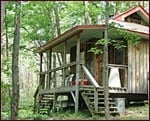by Paul Griffin
I attended a meditation retreat with my teacher Reggie Ray last weekend at the Tibet House in New York City. Reggie Ray is a wonderful and gentle dharma teacher who was a student of Chogyam Trungpa Rinpoche and a longtime Shambhala stalwart. Reggie’s emphasis is on bodywork meditation–essentially on teaching higher level tantric stuff on day one, a relatively controversial position, for what it’s worth– as well as on the dharma in its modern and increasingly universal context. He offers excellent at-home meditation programs, extensive CD packages, and a dathun in Crestone, CO every year (which I attended this past winter). It is always lovely and inspiring to study with one’s teacher, and I have felt a dharmic uplift this past week.

There Is No Natural Religion
A
The Argument. Man has no notion of moral fitness but from Education. Naturally he is only a natural organ subject to Sense.
I. Man cannot naturally Perceive but through his natural or bodily organs.
II Man by his reasoning power can only compare & judge of what he has already perceiv’d.
III. From a perception of only 3 senses or 3 elements none could deduce a fourth or fifth.
IV. None could have other than natural or organic thoughts if he had none but organic perceptions.
V. Man’s desires are limited by his perceptions; none can desire what he has not perceiv’d.
VI. The desires & perceptions of man, untaught by any thing but organs of sense, must be limited to objects of sense.
Conclusion. If it were not for the Poetic or Prophetic character the Philosophic & Experimental would soon be at the ratio [rational calculation] of all things, & stand still unable to do other than repeat the same dull round over again.
There is No Natural Religion
B
I. Man’s perceptions are not bounded by organs of perception; he perceives more than sense (tho’ ever so acute) can discover.
II. Reason, or the ratio of all we have already known, is not the same that it shall be when we know more.
III. [missing]
IV. The bounded is loathed by its possessor. The same dull round even of a universe would soon become a mill with complicated wheels.
V. If the many become the same as the few when possess’d, More! More! is the cry of a mistaken soul. Less than All cannot satisfy Man.
VI. If any could desire what he is incapable of possessing, despair must be his eternal lot.
VII. The desire of Man being Infinite, the possession is Infinite & himself Infinite.
Application. He who sees the Infinite in all things sees God. He who sees the Ratio only sees himself only.
Therefore God becomes as we are, that we may be as he is.
Now I know that’s a mouthful for a leisurely Friday morning blog-reading, but at the same time, this is golden stuff and now seems as good a time as any to contemplate Blake’s dharma. He begins, very tantrically, claiming that “Man cannot perceive but through his natural or bodily organs.” This principle reflects the tantric focus on working within the body, on working with our energies and the subtle body. The basic premise is that only through direct experience do we learn anything.
What I appreciate is the lucidity of Blake’s expression. In The Marriage of Heaven and Hell, Blake strikes an even more luminous tone in perhaps his most famous quote (because of Jim Morrison, “If the doors of perception were cleansed everything would appear to man as it is, infinite. For man has closed himself up, till he sees all things thro’ narrow chinks of his cavern.”
This quote aligns more with argument B of There Is No Natural Religion. In part B, Blake seems to be speaking about the eye of meditation, that sense that perceives the infinite: awareness. Through our practice, we see how all things are infinite and the infinite is in all things.
At the very least, Blake’s poetry could serve as an inspiration to practice. When we sit, we do cleanse the doors of our perception. Blake bears witness to the luminosity that lies on the other side of those doors and on the far side of practice. And his witnessing, as with that of our other dharma forbearers, is so crucial. The fruits of practice are real, he tell us. And in that way, he bids us to practice, practice, practice!

